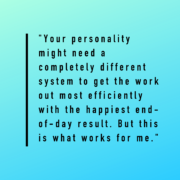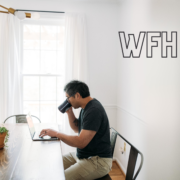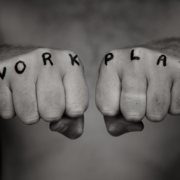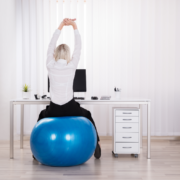Struggling to work from home? Here’s what worked for me
It’s been months since the world as we knew it was turned on its head by things going viral offline for a change and governments being what governments always are — slow. So those of you who weren’t already on extremely familiar terms with your home office have been quickly converted to the cause. As the ripples of trafficless morning commutes and childcare disasters have shaken the foundations of our picket-fence-and-attached-garage society, I can’t help but notice very little has changed in my daily life. I go to work the same way I have for years. My clients are a little more disorganized than usual but for me, the new normal? It’s just the old normal with a lot less traffic noise outside my window. Because now, I work from home.
Like most of you, I suspect, I spend my days writing (and my nights writing, too, but that’s for fun). What I have noticed, though, to my surprise, is that so many people are suddenly giving advice on working from home. While some of that advice might be good, depending on your job and your personality, I can’t help but wonder where most of it’s come from because it just sounds like a lot of extra work to me — I’m not surprised in the least that people are struggling to work at home if they really need to follow all that advice!
Having been a writer and consultant who works from home for more than two decades now and who’s done work on three continents, I thought it might be helpful for me to share some advice about what’s worked for me. Everyone is different. Your personality might need a completely different system to get the work out most efficiently with the happiest end-of-day result. But this is what works for me.
Table of Contents
Be rigid.
At every turn, there’s a digital guru telling us to be flexible. Be kind to yourself. Accept your feelings. Listen to your heart. (Reach for the stars?) I’m no supernatural believer and for me, personal energy lives in lithium cells. So the only kind of flexibility I need in my life lives on a yoga mat that tries to make an appearance every morning but often gets relegated to the corner of shame. Flexibility isn’t just overrated. It’s the problem.
Don’t feel like starting at 8 this morning? It’s ok. You’re on a flexible schedule. Start at 10. Who’s going to notice? Well, you will. We humans are pattern animals. From our language (which is our business, after all) to our breakfast routine, we feel more comfortable when we don’t just know what’s coming next and when — what makes us really secure is feeling it.
So that’s my best suggestion for working at home. Don’t be flexible in the slightest. And this works both ways.
Make yourself a schedule. I usually work from 7 in the morning until 5 in the afternoon with a two-hour break for lunch. That is what works for me but some people like to start later or chop that lunch break down to size. I use it as an excuse to go to the kitchen and prepare a fully-cooked meal rather than grabbing something on the go at my desk. You might be a night owl. The beauty of writing at home is that you can choose when you’re going to do it. But don’t make the mistake of thinking that means you can do it whenever you feel like. Your mind, your body and your words on the page will passionately hate you if you do.
Sound difficult? Self-discipline is the cornerstone of building a successful career where you don’t leave the house in the morning. If you bounce around, you’ll never settle down to the work and it will show. And it will be harder with every passing day to get the rst sentence on the page. There’s another great result, too, which brings me to the next key to my survival in this world.
Leave work at work. 
If you worked in an office, you’d come to the end of the day, put on your coat and get in your car and head home. Work is done. You’ve signalled to your body and mind and everyone you work with that you’ve put in a good day’s effort, gotten a day’s worth of results and it’s over. You’ll be back tomorrow, of course. But until you have to hop back on the treadmill, it’s over and you can chill.
You’ve got hobbies such as working out for fitness or you have people you want to spend time with. Things in your life that have nothing to do with your job. Me too. It’s vital in our lives to make time for “me stuff”. But so many people start to blur the line when they work from home.
I’ve heard a lot of odd advice about physical distancing and visual compartmentalization to help with this but none of that (and we’ll get to that in a minute) has anything to do with it. It’s about time.
When you start work from home in the morning, start work. Don’t be still trying to give advice on that next homework problem. Put down the Facebook and Insta and sit at your desk and pound out some words. They might be the wrong words but they’ll be words. You’re not just doing the job — you’re training your mind to start and focus and that self-discipline is going to serve you well tomorrow. Especially next year and the year after, once it becomes so deeply a part of your routine that you can’t stop and your first sentence at 7 am is spot on.
But when you get to the end of your day (5 pm in my case), that’s it. You wouldn’t voluntarily stay late at your office unless there was a really special circumstance. Sure, we’ve all had clients who needed something in a huge rush and were prepared to pay for the inconvenience. Just like in a traditional office job, overtime is part of the reality from time to time. But it’s not an everyday occurrence and it shocks me how many people simply don’t have a scheduled end time. “When I finish this” is unhelpful. If all your projects can be measured in a few hours, that might be a reasonable way to look at things but if like most of us, you’re pounding away at a single document for days or even weeks and months, endpoints aren’t meaningful delineators of time. Time is, though.
So when it gets to the end of the day, get up and walk away. Turn off your working life the way we used to turn off our word processors and electric typewriters (no, I’m not really ninety-six but I did learn to type on a good-old manual Smith Corona — an irony not lost on me in this viral era). You don’t need physical distance. Nor do you need to stop looking at the place you work. You don’t even need to stop sitting at the desk (or on the couch, which is where most of my work actually gets done day-to-day). But when your scheduled day is over, turn yourself off and put up a “gone home” sign in your subconscious. Work ethic is great but burnout ain’t so hot. Twelve-hour days at the keyboard will come back to haunt you before long and productivity aren’t proportional to hours spent.
Be in the moment.
People have some funky ideas about Buddhist doctrine but my favourite (and most helpful) piece of traditional wisdom loosely translates to “life happens here and now — why are you looking for it somewhere else?” — it’s been written by so many great teachers for more than two thousand years in various ways but that’s about it.
The oddest advice I have seen is also the most popular. Have a de ned space for your work. Go into it and come out of it. Pack away your work things and put them away at the end of the day.
Now, I’m not sure about you but I live in a small apartment and I have for pretty much my entire adult life. I don’t have space for a dedicated room for working that I don’t use for anything else. Not to mention I don’t like working at a desk and having a special couch just to sit on when I’m copywriting but not when I’m working on my own personal projects or watching a movie? Does that sound as silly to you as it does to me?
I get the sentiment. Leave work at work. Arrive, work, depart.
It’s a fantastic idea but it’s not a physical or visual one. It’s a mental exercise. If you were working in a traditional office and your computer didn’t work, you’d switch to another desk pretty fast and it wouldn’t change your level of productivity. You might be assigned a different office altogether or even switched to another building. It likely wouldn’t change much. So why would walking into another room and sitting at a desk do it for you?
It’s not about where you are. It’s about what you’re doing.
If you can’t focus, that’s the problem. Try to solve that one. For me, it’s about mentally preparing. I sit and breathe — often meditating in the morning prepares my mind for the day ahead. However, you prepare yourself, though, be ready to start work. Some people like to go for a morning run or walk their pet alpaca or whatever gets them out in the fresh air. Your routine is important — especially your just-after-waking-up routing. Then you sit down and start. Until you finish.
And this is where the advice really falls off the rails for me. They talk about simulating a traditional work environment. Well, I don’t like traditional work environments. There’s a reason I chose to work from home. It takes me away from office gossip and noise, constant interaction that distracts from my work and, more than anything else, uncomfortable working situations. Offices and desks are, for some people, comfortable enough. But they were designed for a purpose — efficiency and formality. Comfort is just a grafted-on byproduct of a more health-conscious world.
I’m not saying everyone should follow my lead and spend eight hours a day working on the couch — and if you don’t live an active lifestyle outside your job, going for a jog and hiking and playing football in the back garden every chance you get, this isn’t going to be a great choice. But sitting in a chair is still sitting. And I can’t honestly tell you the last time I saw anyone sitting at a desk with particularly great posture so my tendency to slouch is probably not doing me any worse on the cushions than it would anywhere else.
My advice is simply this — you don’t need a special space and you don’t need to pack and unpack your life every morning and evening to be productive or achieve separation from your work. If you give yourself a schedule and stick to it, your workspace can be wherever you feel comfortable and you shouldn’t feel guilty for that. You’re going to spend half your waking life doing this job. You deserve to feel comfortable wherever you do it, whether that’s at a desk, on a couch or under a tree in the garden (my preferred location sometimes when it’s a sunny day).
Be now, in the moment, in this place. And when it’s over, be in that one.
The dog didn’t eat your homework.
Like most of you, I suspect, the only part of school I liked was when I got to write something creative. Formal essays bored me and listening to the teacher was an exercise in unrelenting tedium — I spent far more time watching the clock and daydreaming than anything else, except perhaps writing new stories in my head that I couldn’t wait to get written down when I left the classroom. But the thing that I hated most of all, I think, was that school didn’t stay at school. Having to go home and do mind-numbing exercises and repetitive tasks (school is, after all, just busywork, when it comes down to it) was nothing short of painful.
But this isn’t homework. This is the career I (and you) chose after careful consideration. This is what I want to be doing with my days and I don’t regret it in the slightest.
That leads me to be rather curious and dismayed when people look at their work the same way I used to approach my essay questions on the deeper meaning of the balcony scene in Romeo and Juliet. You’re not looking for an excuse not to do it. If you want to pick another career, go for it. But if you want this one, embrace the life you’ve got and write, already!
Working from home might feel new and different to many of you who haven’t been doing this your entire careers but it’s not actually a change from the work you do elsewhere. It’s usually quieter and calmer, more comfortable and on your own terms. It takes far more self-motivation and self-discipline and if you’re running back and forth to the kitchen for another cup of coffee just because nobody’s there to tell you to get back to work, this may be something you need to address with your inner voices. When it comes down to it, though, this is a wonderful career path. I get to work with different industries, different ideas. And produce short and long work for incredibly varied audiences. I write for text, audio, video, whatever is needed in the moment. It’s unpredictable but it is, after all, fun. I love writing and it’s what I do with my days.
So when you’re working at home, try to forget the fact that you didn’t necessarily choose to make this your office routine (although I did and I wouldn’t have it any other way). Stop making excuses and remember the work is the same no matter where you’re doing it. You don’t need an office to produce good copy, just like the best cup of coffee you ever have might yet come from your own kitchen.
Go big and go home.
That’s it in a nutshell. There have definitely been people out there doing this job longer than me and many of them have been doing it at home since before I was born. But after two decades of the shortest commute in the world, this is what I’ve come up with.
Make yourself a plan, a detailed schedule and be rigid with it. If an emergency comes up, deal with it. Otherwise, sit there and get to it.
When you start, start. And when you finish, leave work in your work headspace. You’ve got plenty of living left to do that doesn’t need you to check your email just one more time or pound out another thousand words before bed.
If you’re at work, be at work and be present with yourself right there. When work ends, live that reality without making excuses. At the end of the day, you owe it to yourself to switch off from your job and change focus for a bit!
Remember what you loved about the work in the first place. It’s not a homework assignment just cause it’s under the same roof as your bed. This isn’t preparation for an exam — it’s your life’s work. So take a deep breath and put your fingers on the keys.
After all that reflecting, there is only really one further piece of advice that I can give you — stop feeling uncomfortable about the fact that home and work are no longer separated by the vast morning commute. Make yourself, if nothing else, at home in the new reality.
In the words of your much-overlooked doormat, the wisest instruction I can echo is this: Welcome home.
Continue Reading: Parents working from home: How to balance the family-life and work-life
About the Author

 workfromhome-copywritercollective
workfromhome-copywritercollective
 Home Office Solutions-copywritercollective
Home Office Solutions-copywritercollective WorkFromHome-copywritercollective
WorkFromHome-copywritercollective WFH-copywritercollective
WFH-copywritercollective ParentWorking-copywritercollective
ParentWorking-copywritercollective Easystretches-copywritercollective
Easystretches-copywritercollective
 Freelancers-copywritercollective
Freelancers-copywritercollective